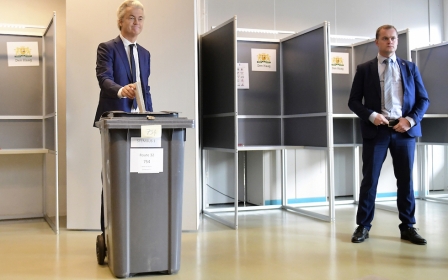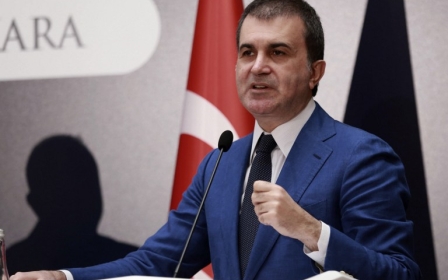Dozens of pro-Kurdish officials arrested in Turkey crackdown

Dozens of politicians and activists belonging to the pro-Kurdish People's Democracy Party (HDP) and Democratic Regions Party (BDP) have been arrested in Turkey, including two MPs.
Berdan Ozturk and Mehmet Emin Adiyaman, HDP MPs, were arrested on Thursday during a demonstration in favour of the No campaign for the upcoming constitutional referendum on 16 April.
The deputies were taken for questioning to the Ardahan Courthouse. They were later released.
According to a spokesperson for the party, on Wednesday and Thursday 122 HDP executives and members were detained in a number of cities including Istanbul, Antalya, Bursa, Gazientntep and Van.
Turkey's parliament last month stripped one of the HDP's two leaders of her status as a member of parliament and jailed the other. The HDP, the second-largest opposition party, says 13 of its lawmakers have been jailed, and as many as 5,000 of its members have been detained.
President Recep Tayyip Erdogan says the constitutional changes proposed in the referendum will give Turkey stronger leadership. But the HDP and the main opposition secular CHP say it will lead to a one-man rule and erode basic freedoms.
Erdogan and the government say the HDP is an affiliate of the militant Kurdistan Workers Party (PKK), which has waged an armed insurgency in Turkey's largely Kurdish southeast for more than three decades. The HDP denies direct links to the PKK, which is considered a terrorist organisation by Turkey, the United States and the European Union.
HDP politicians said on Tuesday they were optimistic that a majority of Turks would vote against expanding the powers of President Erdogan in the referendum.
"Many Europeans here unfortunately think that Erdogan is invincible, but he is stoppable," Hisyar Ozsoy, a Peoples' Democratic Party (HDP) member of Turkey's parliament, said after meeting with German lawmakers.
Ozsoy, one of four HDP lawmakers visiting the German parliament this week, said he hoped that the importance of the proposed constitutional change would help boost voter turnout in Turkey and among Turks living in the diaspora in Europe.
However, he also criticised EU leaders for their appeasement of Erdogan, particularly German Chancellor Angela Merkel.
"The whole country is like a battlefield. The fact is that Erdogan has used the coup attempt as an opportunity to repress every single oppositional voice in this country over the last one-and-a-half years. And what did Europe do? They mainly turned a blind eye and they watched it because they had a refugee deal with Erdogan. That was particularly Ms Merkel," Ozsoy added.
The German government said on Tuesday it would allow 1.4 million Turks who live in Germany and are eligible to vote to cast their ballots at 13 voting sites between March 27-April 9.
Tensions between the two NATO allies have spiked since Turkey arrested a German-Turkish journalist last month, and after Erdogan accused Germany of "fascist actions" after local officials cancelled some rallies in support of the referendum.
Experts say about 60 percent of Turkish voters casting polls in Germany backed Erdogan's AKP party in the last presidential election, and the vote could turn out similarly this time.
But Ozsoy cited growing concerns among Turks from across the political spectrum about the proposed changes, which he said would "turn Turkey into a dictatorship".
Middle East Eye propose une couverture et une analyse indépendantes et incomparables du Moyen-Orient, de l’Afrique du Nord et d’autres régions du monde. Pour en savoir plus sur la reprise de ce contenu et les frais qui s’appliquent, veuillez remplir ce formulaire [en anglais]. Pour en savoir plus sur MEE, cliquez ici [en anglais].




